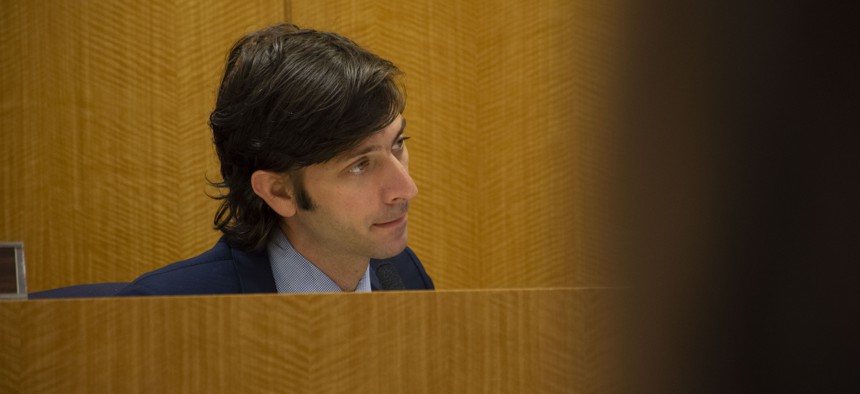Controversial nonprofit Children's Community Services gets a visitor
NYN Media had visited the mysterious nonprofit’s administrative offices on a previous occasion.

New York City Councilman Stephen Levin visited a Brooklyn hotel on June 15 that doubles as a homeless shelter run by Children's Community Services. Zach Williams
New York City Councilman Stephen Levin had one big takeaway June 15 after becoming the first elected official on record to visit Children’s Community Services, a nonprofit organization that manages the housing of homeless people in city hotels.
There’s not much space in those rooms and the facilities are lacking.
The visit to a CCS-run hotel near his downtown Brooklyn district office offered him a glimpse into the operations of the organization, which in just a few years grew from a small-time operation with a budget $250,000 in the red in 2014 into one of the biggest city contractors, with nearly a half-billion dollars in contracts with the city Department of Homeless Services. There to greet Levin at the hotel were a handful of caseworkers, housing specialists, clients – and Thomas Bransky, the founder and executive director of a nonprofit that has no social media presence and a mostly empty listed headquarters in Jamaica, Queens.
It had taken weeks to arrive at this point after planning the meeting with Branksy, which Levin had described as an effort to see if the nonprofit was delivering the services required by its contracts.
Bransky and his operation had proven to be somewhat arcane. He has not responded to multiple requests for comment and a January 2018 meeting with Queens Community Board 8 is among the few public records that record an interaction with him.
NYN Media had visited the nonprofit’s administrative offices on a previous occasion and noted its headquarters appeared to be a call center in a commercial walk-up and another office address listed on a 2017 contract matched that of a UPS office.
Nonetheless, Bransky and plenty of his staff were on hand to show Levin the rooms where families can stay on the city’s dime for up to $270.62 per night, including social services. Though families routinely stay in such shelters for more than a year, they could hardly be called a home, Levin told New York Nonprofit Media in a June 21 interview. About 150 square feet does not leave much space for the routines of family life – no place to cook, play, store food, or do homework, Levin noticed.
“The thought of my child not being able to move and being kind of confined to such a small space,” Levin said in the interview. “It’s kind of heart breaking. That’s what stuck with me.”
Levin said the afternoon visit afforded him time to only observe how the nonprofit engages its clients, and some of the challenges faced by staff members. Questions surrounding the origins of the organization, and its outlier status in the nonprofit sector did not come up in discussions with Bransky, according to Levin who chairs the New York City Council’s Committee on General Welfare.
But from what Bransky and his employees showed Levin, the situation at the shelter appeared to be more a result of city policy, than a failure by the Queens-based nonprofit to meet the obligations of its contract, which includes helping clients access permanent housing and social services such as daycare and food stamps.
“Nothing jumped out at me in terms of the provider being problematic,” Levin said. “The overall structure of providing homeless services in a hotel is a problem. It’s not a longtime appropriate place for a child to live.”
Yet, thousands of families live in a shelter system that is still confronting record levels of homelessness citywide, despite some progress in the past year. About 60,000 people are sheltered by the city, and when there is no space at designated shelters, the city has to put families and individuals up in hotels, per a state mandate to provide emergency shelter services to anyone in need of it.
Getting them out of hotels has been a problem. Some clients of Children’s Community Services have said that the nonprofit does not do enough to help them. Systemic issues also linger. Landlords are known to discriminate against the holders of housing vouchers, which at roughly $1,500 for a family are not enough to rent apartments in the city’s expensive housing market, Levin said.
An increase of $400 to vouchers could give homeless families a competitive edge, he added. The visit to CCS also inspired the councilman to consider drafting legislation that would require reporting on the length-of-stays among different types of housing provided to the city’s homeless, including private apartments, city hotels and more traditional permanent facilities.
According to Bransky and the staff at Children’s Community Services, the nonprofit has a “reasonably high success rate” at securing housing for its clients and has a caseworker-to-client ratio of 25-to-1, though the only evidence substantiating these claims appears to be their word.
As for Bransky, an executive director with a past in the hotel industry who has not responded to past efforts by NYN Media to contact him, he seemed to be in control of his role overseeing the nonprofit, said Levin. The Council member said he is looking to visit again later in the summer.
“He was very engaging,” Levin said of Bransky. “He had a wide understanding of the services he was providing and he was very engaging. He acknowledged the limitations to the (city’s homeless services) model.”
This article has been updated to clarify that the New York City Department of Homless Services pays a maximum of $270.62 per night for emergency housing and services in city hotels.